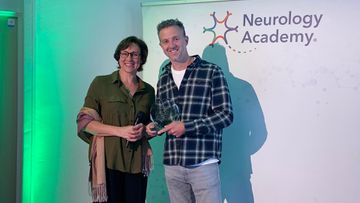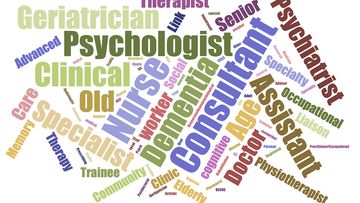World Alzheimer’s Day 2024: progress in diagnosis, treatment and prevention
KnowledgeWorld Alzheimer’s Day is an opportunity to reflect on recent transformative advances in dementia research and care. The past months have been marked by significant breakthroughs, pushing the boundaries of how we will diagnose, treat and manage Alzheimer’s disease. From new treatments like lecanemab, the first disease-modifying therapy approved in the UK, to the potential of blood tests and artificial intelligence in early detection, we are entering a promising time to address the growing health challenge of dementia.
In August, lecanemab became the first drug approved by the UK’s medicines regulator MHRA to slow the progression of early-stage Alzheimer’s disease. Lecanemab is an antibody intravenous infusion therapy that targets and removes beta-amyloid plaques from the brain. While it has been licensed for use in the UK, it will not be available on the NHS at this stage. On the same day, NICE issued draft guidance saying that the benefits “are too small to justify the costs to the NHS”. However, lecanemab marks a significant milestone in disease-modifying treatments for Alzheimer’s, and with numerous potential treatments currently in advanced clinical trials, more breakthroughs are anticipated in the coming years.
We are getting closer to developing accurate, accessible blood tests for early diagnosis of Alzheimer’s and other dementias. Currently, only 2% of people with symptoms undergo specialist tests like PET scans or lumbar punctures, due to high cost or invasiveness. Timely and accurate diagnosis is vital for preserving as much brain function as possible, for as long as possible, and for participation in clinical trials. A low-cost, non-invasive blood test could transform our approach to diagnosis and support the development of new treatments. Recent studies have shown promising results, with blood tests achieving 90% accuracy in detecting Alzheimer’s disease. Two UK-based research teams, forming the Blood Biomarker Challenge, are currently running trials to validate blood tests for NHS use.
Artificial intelligence (AI) is also set to play a role in dementia diagnosis. Researchers at Cambridge University have developed an AI tool capable of predicting whether individuals with early signs of dementia will develop Alzheimer’s in the future. This machine learning model not only shows to be more accurate than current clinical diagnostic tools, but could also reduce the need for invasive testing and would therefore offer healthcare professionals a powerful new tool to help match the right patients to clinical trials. In Scotland, researchers from the universities of Edinburgh and Dundee are conducting a similar AI-based initiative. They are analysing one million anonymised brain scans from NHS Scotland’s database, collected between 2008 and 2018 during routine clinical care. The SCAN-DAN (Scottish AI in Neuroimaging to predict Dementia and Neurodegenerative Disease) project, part of a global collaboration called NEURii, aims to identify patterns or early signs of dementia in CT and MRI scans. This research could lead to AI tools that assist radiologists in detecting the earliest signs of dementia, potentially transforming early diagnosis and intervention.

Image from the EAN Brain Health Strategy
In recent years, there has been a growing emphasis on brain health as an integral part of public health and healthcare optimisation, in an effort to reduce the likelihood of dementia and other neurological conditions. The European Association of Neurology (EAN) has established a brain health strategy group to address the importance of promoting, protecting and preserving brain health. Through their five pillars – building alliances, supporting policy-making, fostering research, promoting education, and raising public awareness – the EAN hopes to make brain health a central focus in both healthcare and society. Additionally, a recently published report by The Lancet reveals that nearly half of dementia cases worldwide could be prevented or delayed by addressing 14 modifiable risk factors. Since the 2020 Lancet Commission on dementia, two new risk factors have been added to the list: untreated vision loss and high LDL cholesterol. This comprehensive analysis of global research provides compelling evidence that maintaining a healthy lifestyle – through education, social engagement, physical activity, and avoiding head injury or cardiovascular risks – can boost brain resilience. The report is valuable not only for individuals but also for guiding governments and fundamental research into reducing dementia risk.

Image from 'Dementia prevention, intervention, and care: 2024 report of the Lancet standing Commission'
As we continue to explore these exciting developments, the need for education and support for healthcare professionals remains essential. Next week, we will be hosting our 8th Dementia MasterClass in Sheffield, bringing together neurologists, elderly care physicians, psychiatrists, nurse specialists, therapists, and GPs. With each course fully booked, the enthusiasm for continuing education in this field is clear.
This is the second year we are running a two-module Dementia MasterClass, where delegates will complete an intermodule project as part of the course. These projects offer a chance to put new knowledge into practice, improving local services and patient outcomes. Delegates have creative freedom in their approach – whether it's service delivery, patient management, or treatment pathways – ensuring their work addresses a real local need.
Prof Iracema Leroi, head of Faculty, reflected on the impact of last year’s projects:
'There was a fantastic output in terms of quality and number of projects resulting from this Dementia MasterClass. Most delegates followed a really robust audit or quality improvement methodology.
Many delegates said that, without the Academy structure and support, they wouldn't have carried out this work - which demonstrates how the course can have a real impact on individuals with dementia.'

Find out more about last year’s delegate projects in our education with impact report, or read about the winning project developing a frailty memory service.
Related articles
Promoting prevention, supporting management
Led by proactive clinicians determined to see improvement in the way we prevent, diagnose and manage dementias, Dementia Academy supports healthcare professionals with the latest tools, resources and courses to do just that.


